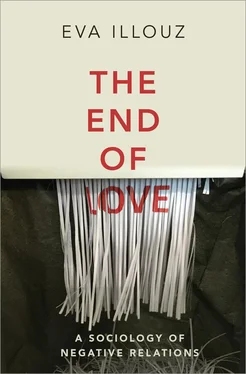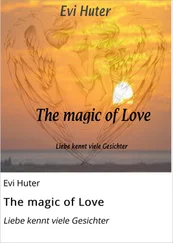13 6. Divorce as a Negative Relationship The End of Love Divorce and Women’s Position in the Emotional Field The Narrative Structure of Departing Sexuality: The Great Separation Consumer Objects: From Transitional to Exiting Objects Autonomy and Attachment: The Difficult Couple Emotional Ontologies and Non-Binding Emotional Contracts Emotional Competence and Women’s Position in the Relational Process Notes
14 Conclusion: Negative Relations and the Butterfly Politics of Sex Notes
15 Bibliography
16 Index
17 End User License Agreement
1 Cover
2 Table of Contents
3 Endorsement
4 Title Page
5 Copyright
6 Dedication
7 Epigraph
8 Acknowledgments
9 Begin Reading
10 Conclusion: Negative Relations and the Butterfly Politics of Sex
11 Bibliography
12 Index
13 End User License Agreement
1 a
2 iii
3 iv
4 v
5 ix
6 x
7 1
8 3
9 4
10 5
11 6
12 7
13 8
14 9
15 10
16 11
17 12
18 13
19 14
20 15
21 16
22 17
23 18
24 19
25 20
26 21
27 22
28 23
29 24
30 25
31 26
32 27
33 28
34 29
35 30
36 31
37 32
38 33
39 34
40 35
41 36
42 37
43 38
44 39
45 40
46 41
47 42
48 43
49 44
50 45
51 46
52 47
53 48
54 49
55 50
56 51
57 52
58 53
59 54
60 55
61 56
62 57
63 58
64 59
65 60
66 61
67 62
68 63
69 64
70 65
71 66
72 67
73 68
74 69
75 70
76 71
77 72
78 73
79 74
80 75
81 76
82 77
83 78
84 79
85 80
86 81
87 82
88 83
89 84
90 85
91 86
92 87
93 88
94 89
95 90
96 91
97 92
98 93
99 94
100 95
101 96
102 97
103 98
104 99
105 100
106 101
107 102
108 103
109 104
110 105
111 106
112 107
113 108
114 109
115 110
116 111
117 112
118 113
119 114
120 115
121 116
122 117
123 118
124 119
125 120
126 121
127 122
128 123
129 124
130 125
131 126
132 127
133 128
134 129
135 130
136 131
137 132
138 133
139 134
140 135
141 136
142 137
143 138
144 139
145 140
146 141
147 142
148 143
149 144
150 145
151 146
152 147
153 148
154 149
155 150
156 151
157 152
158 153
159 154
160 155
161 156
162 157
163 158
164 159
165 160
166 161
167 162
168 163
169 164
170 165
171 166
172 167
173 168
174 169
175 170
176 171
177 172
178 173
179 174
180 175
181 176
182 177
183 178
184 179
185 180
186 181
187 182
188 183
189 184
190 185
191 186
192 187
193 188
194 189
195 190
196 191
197 192
198 193
199 194
200 195
201 196
202 197
203 198
204 199
205 200
206 201
207 202
208 203
209 204
210 205
211 206
212 207
213 208
214 209
215 210
216 211
217 212
218 213
219 214
220 215
221 216
222 217
223 218
224 219
225 220
226 221
227 222
228 223
229 224
230 225
231 226
232 227
233 228
234 229
235 277
236 278
237 279
238 280
239 281
240 282
241 283
242 284
243 285
244 286
245 287
246 288
247 289
248 290
249 291
250 292
251 293
252 294
253 295
254 296
255 297
256 298
257 299
258 300
259 301
260 302
261 303
262 306
263 307
264 308
265 309
266 310
267 311
268 312
269 313
270 314
Praise for The End of Love
“Eva Illouz presents a bleak but fascinating analysis of what the modern world has done to love … The great French novelist Honoré de Balzac said he wanted to be the historian of the human heart. The Franco-Israeli sociologist Eva Illouz might be called the historian of human heartbreak.”
The Irish Times
“Eva Illouz’s work combines theoretical sophistication with a sharp eye for what’s essential in contemporary culture. This singular blend has made her an intellectual star of the European world. The End of Love , the fruit of twenty years of reflection about the ways in which 21st-century emotions are inevitably bound up with consumer capitalism, will show American readers too why Illouz is one of the most important thinkers of her generation.”
Susan Neiman, Director of the Einstein Forum
“ The End of Love is a provocative new installment in Eva Illouz’s two decades-long interrogation of the relations between the modern idea of love and the cultures of capitalism. As contemporary capitalism thrives on dislocation, disruption, casualness, uncertainty, and precarity, Illouz draws attention to a corresponding morphing of sexual relations and inner life. Our contemporary culture, she shows, is suffused with practices of ‘unloving’, of quickly forming and dissolving intimate ties in a quest for selfempowerment understood as radical autonomy and the exercise of free choice. Written with passion, insight, and breathtaking scope, it is the best sociological examination of the disorganization of emotional life wrought by the capitalist market, consumer culture, and the paradoxes of freedom.”
Gil Eyal, Columbia University
The End of Love
A Sociology of Negative Relations
EVA ILLOUZ
polity
Originally published in German as Warum Liebe endet: Eine Soziologie negativer Beziehungen
©Eva Illouz 2018
© Suhrkamp Verlag Berlin 2018
All rights reserved by and controlled through Suhrkamp Verlag Berlin
First published in the United States of America by Oxford University Press in 2019
English Translation © Oxford University Press 2019
This edition published by Polity Press 2021
Polity Press
65 Bridge Street
Cambridge CB2 1UR, UK
Polity Press
101 Station Landing
Suite 300
Medford, MA 02155, USA
All rights reserved. Except for the quotation of short passages for the purpose of criticism and review, no part of this publication may be reproduced, stored in a retrieval system or transmitted, in any form or by any means, electronic, mechanical, photocopying, recording, or otherwise, without the prior permission of the publisher.
ISBN-13: 978-1-5095-5026-5
A catalogue record for this book is available from the British Library.
The publisher has used its best endeavors to ensure that the URLs for external websites referred to in this book are correct and active at the time of going to press. However, the publisher has no responsibility for the websites and can make no guarantee that a site will remain live or that the content is or will remain appropriate.
Every effort has been made to trace all copyright holders, but if any have been overlooked the publisher will be pleased to include any necessary credits in any subsequent reprint or edition.
Читать дальше












